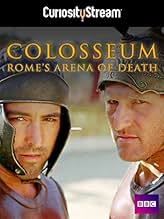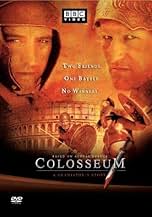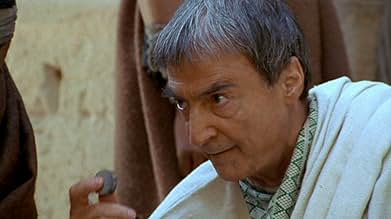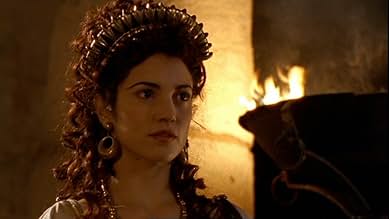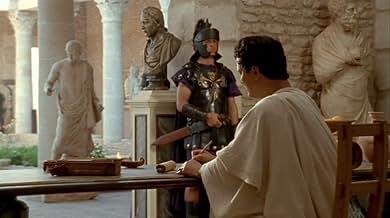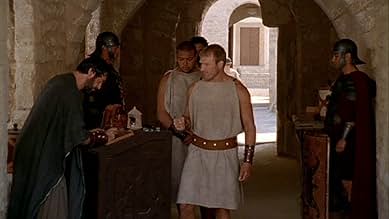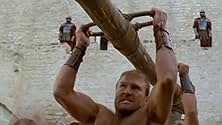IMDb RATING
7.0/10
400
YOUR RATING
Verus, a slave captured in the Balkans, sees a gladiatorial career in the arena as a preferable alternative to life in a rock quarry.Verus, a slave captured in the Balkans, sees a gladiatorial career in the arena as a preferable alternative to life in a rock quarry.Verus, a slave captured in the Balkans, sees a gladiatorial career in the arena as a preferable alternative to life in a rock quarry.
- Director
- Writers
- Stars
- Nominated for 1 BAFTA Award
- 1 nomination total
Michael Pennington
- Narrator
- (voice)
John Benjamin Hickey
- Verus
- (voice)
Nicolas Chagrin
- Tiberius Claudius Eutychus
- (uncredited)
Aykut Hilmi
- Main Gladiator
- (uncredited)
- Director
- Writers
- All cast & crew
- Production, box office & more at IMDbPro
Featured reviews
One of the best documentaries I've seen is "Pompeii: The Last Days". Based on historical records and artifacts, the film recreates the final days of the doomed city of Pompeii. What makes it exciting is that they filmmakers recreated the city and a small group of doomed residents. Through their lives, you learn what it was like to have lived during this harrowing event.
Here in "Colosseum: A Gladiator's Story" the filmmakers have once again used the same type of film making--though they also provided quite a bit of narration along with people acting out the story of a real life gladiator. Using some CGI and nice costumes, the folks from the BBC recreate this life in amazing detail. My only gripe is with the title of this show, as the Colosseum wasn't a big focus at all of the film--it was more the story of a gladiator, not the building. So, if you are looking for an in-depth discussion of the building--with its amazing basement, trap doors, etc., then this is not a film for you. Still, it's very well done and quite compelling.
Here in "Colosseum: A Gladiator's Story" the filmmakers have once again used the same type of film making--though they also provided quite a bit of narration along with people acting out the story of a real life gladiator. Using some CGI and nice costumes, the folks from the BBC recreate this life in amazing detail. My only gripe is with the title of this show, as the Colosseum wasn't a big focus at all of the film--it was more the story of a gladiator, not the building. So, if you are looking for an in-depth discussion of the building--with its amazing basement, trap doors, etc., then this is not a film for you. Still, it's very well done and quite compelling.
There is too little documentary value in this docu-drama, and frankly speaking I do not exactly know what the BBC invested so much in it. it may have been for rating reasons at the time of the release of the 'Gladiator' big studios movie, I am just speculating. The film focuses on the history of a gladiator by the time the Colosseum was built we learn a few new facts about the daily life and training methods of the gladiators and the organization of the fights, but the documentary value is too diluted and the fiction part not really too interesting. I found confusing the mix of first person story telling and historical comment in the off-screen commentary. Overall a below-average docu-drama.
This drama documentary was included as a DVD extra on Pompeii: The Last Day (2003) TV. I started watching it with little expectations and actually ended up liking it better than the main movie on the DVD.
One of the main reasons I enjoyed Coloseum: A Gladiator's Story is that the spoken dialog was in Latin. I studied Latin in High School, but have never heard it spoken on screen before. I think the movie would be understandable to someone who did not study Latin, as the narration is in English.
I liked the references to Martial (who I have not read) and Seutoneus (who I am just starting to read).
This story was not just about Gladiators, but about the political climate of the time and the reasons for building the Flavian Amphitheatre (known today as the Colosseum).
One of the main reasons I enjoyed Coloseum: A Gladiator's Story is that the spoken dialog was in Latin. I studied Latin in High School, but have never heard it spoken on screen before. I think the movie would be understandable to someone who did not study Latin, as the narration is in English.
I liked the references to Martial (who I have not read) and Seutoneus (who I am just starting to read).
This story was not just about Gladiators, but about the political climate of the time and the reasons for building the Flavian Amphitheatre (known today as the Colosseum).
Odd mix of original language, voice-over (multiple narrators with not distinctive enough voices), filmed drama, attempt at a documentary. I found it enjoyable, because I enjoy nearly everything about the classical world, and enjoy accuracy if the entertainment factor isn't there.
It was nice to see some myths defused, such as gladiators were always killed in the matches. But information regarding the building itself was glossed over. It's an architectural marvel, and deserves as much attention as the bloody spectacles that went on inside.
So if you're a history buff, this isn't boring. If you're not, you may be bored and possibly confused. And it seems that something with this big a budget could have been better. The voice over narrative consists of quotes, the narrator, the subject of the story (Verus the slave), so it gets a bit crowded.
The big cat facts and portrayal were probably the most interesting parts of the video
It was nice to see some myths defused, such as gladiators were always killed in the matches. But information regarding the building itself was glossed over. It's an architectural marvel, and deserves as much attention as the bloody spectacles that went on inside.
So if you're a history buff, this isn't boring. If you're not, you may be bored and possibly confused. And it seems that something with this big a budget could have been better. The voice over narrative consists of quotes, the narrator, the subject of the story (Verus the slave), so it gets a bit crowded.
The big cat facts and portrayal were probably the most interesting parts of the video
Colosseum: A Gladiator's Story is a surprisingly good documentary. It seems to be the only movie about gladiators that isn't dramatically romanticized. This doesn't mean the story is 100% true but it is at least based on the only real documented fight in the arena. Seeing this movie gives the opportunity to have a look in the live of a gladiator.
The special effects and the background pictures in the movie aren't really great, which is disappointing. One has to admit this hasn't really an effect on the tensity of the movie. The movie reflects on the customs and the values of the Roman society. Besides that it gives information about the (motives behind the) construction of the Colosseum and the fate of gladiators and other slaves.
The special effects and the background pictures in the movie aren't really great, which is disappointing. One has to admit this hasn't really an effect on the tensity of the movie. The movie reflects on the customs and the values of the Roman society. Besides that it gives information about the (motives behind the) construction of the Colosseum and the fate of gladiators and other slaves.
Did you know
- TriviaDespite popular belief that gladiatorial matches ended in death, 90% of gladiators survived a given match. The rewards were so great for top gladiators that about one-third were volunteers.
Details
- Release date
- Country of origin
- Official sites
- Languages
- Also known as
- Colosseum: A Gladiator's Story
- Filming locations
- Production companies
- See more company credits at IMDbPro
Box office
- Budget
- £2,169,571 (estimated)
- Runtime59 minutes
- Color
- Aspect ratio
- 16: 9 Enhanced
Contribute to this page
Suggest an edit or add missing content


